Shereen Malherbe's Blog, page 12
January 25, 2024
Arab Lit- Eight Publishers Bringing Out Gazan ‘Diary of a Genocide’ in 7 Languages
January 23, 2024
By ArabLit Staff
Political scientist and multi-award-winning novelist Gazan Atef Abu Saif — author of the moving The Drone Eats with Me, an account of the 2014 bombardment of Gaza — has a new book coming near-simultaneously from at least eight publishers in seven languages.

The book, Don’t Look Left: A Diary of a Genocide, is composed of diary-like reminiscences that offer a first-hand, day-by-day account of the bombardment and invasion of Gaza from a keen observer of the human condition.
Abu Saif is originally from Jabalia Camp, north of Gaza City, but moved to the West Bank in 2019 when he became the PA Minister of Culture. However, he was visiting Gaza in early October with his 15-year-old son Yasser when the decimating bombardment of Gaza began, in the wake of the October 7 killings and kidnappings.
Publisher Comma Press writes that, these diaries, many of which were written as WhatsApp texts and voice memos, “follow a man who came to Gaza as a government minister and who was quickly reduced to running through the streets looking for shelter, like so many other Gazans, after the hotel he was staying in was bombed. The accounts cover everything from first-hand reports of shockingly graphic rescue efforts — many involving close relatives or fellow journalists and writers — to living in UN shelters in schools, to being displaced multiple times, struggling to find food and maintain contact with the outside world, to the decision to leave his father in the north for his own son’s safety, as
well as living for over a month in a tent, an impromptu refugee camp in UN Stores facility near Rafah.”
Comma released an shorter, ebook-only version of the diaries in late December. This features the first 60 days of his experiences, while Atef was still living in a tent a Rafah. The final version will cover the first 85 days of the genocidal destruction of Gaza.
Eight publishers have so far signed up to publish the diaries this winter and spring in seven languages: English, Spanish, Italian, Japanese, Indonesian, Icelandic, and Portuguese.
When talking about their reasons for bringing out the book, several publishers mentioned the failure of most media to fairly document the last several months in Gaza, as well as our collective responsibility to do whatever we can to halt a genocide in progress. As Patrizia Di Filippo, of the Barcelona-based Blackie Books, said, “We wanted to be part of this because the Western media has no intention of going beyond the euphemism and calling it ‘war.’ And it is not a war, it is a genocide. An ethnic cleansing. We believe that we cannot sit still and observe, and we must help with what we know how to do, which are books.”
Read more:
Six Publishers on Why They’re Bringing Out ‘Don’t Look Left’
Recommended: To Read & to Translate by Gazan Writer Atef Abu Saif
UK Muslim Literature Festival with Palestinian events for all

Due to the horrifying events unfolding in Gaza, next month’s Muslim LitFest will have a special focus on Palestine. We hope these events will help spread awareness about Palestinian culture and heritage, which have never been in more danger of being destroyed.
Slide through the images to see what events will be taking place and when.
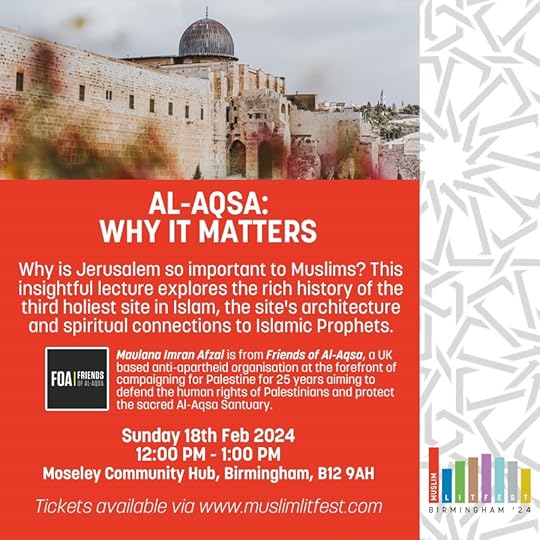

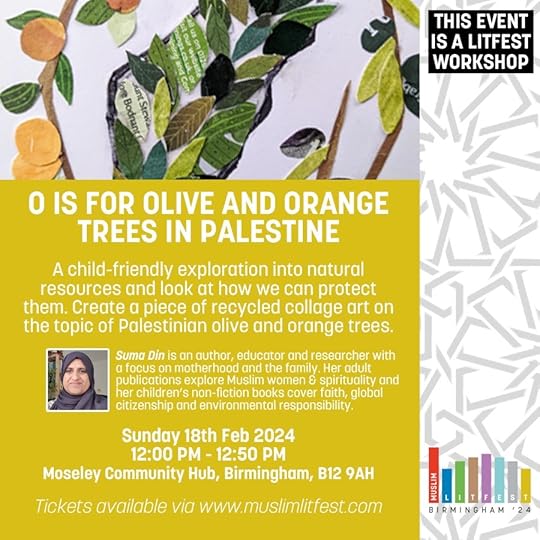
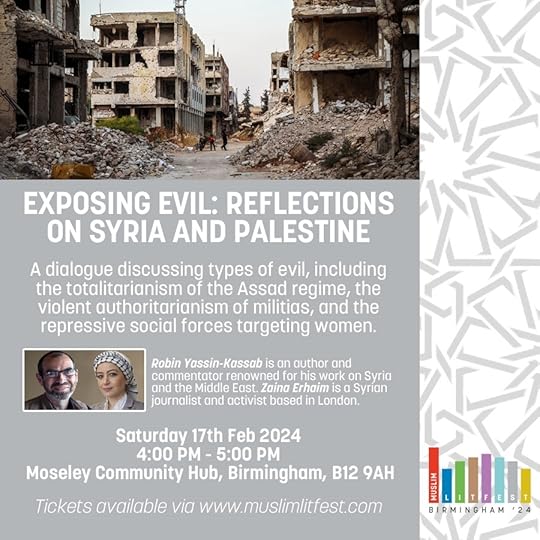
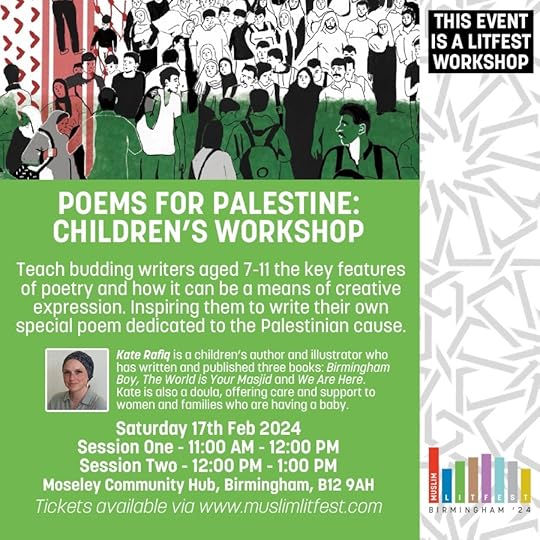
Please share widely so as many people as possible can come and show their support for Palestine and take part in these events.
If you can’t attend but would like to support the event please visit: http://www.muslimlitfest.com or email: mlf@muslimlitfest.com
January 24, 2024
Palestine Museum US re-screens the documentary film ‘Bank of Targets’ by the recently martyred Gaza filmmaker, Rushdi Al-Sarraj.

Saturday Jan 27, 2024, 12:00 Noon US EDT; 18:00 Europe; 19:00 Palestine.
Film “Bank of Targets,” by the recently-martyred Gaza filmmaker/journalist Rushdi Al-Sarraj.
A powerful documentary film directed by acclaimed Palestinian filmmaker/journalist the late Rushdi Sarraj (he was murdered by Israeli bombings last week), sheds light on the horrifying aftermath of the relentless Israeli bombing campaigns on the Gaza Strip.
Released amidst rising concerns over the recurring cycle of violence, the film offers a harrowing examination of the extensive destruction and immense loss of life caused by these devastating attacks. Through its poignant storytelling and compelling visuals, “Bank of Targets” provides an insight into the profound impact of Israeli airstrikes on the lives of Palestinians in Gaza.
To register to attend this event via Zoom please click here.
January 18, 2024
Palestine Book Awards- Tonight, 6pm UK

Reposted with permission. My invitation to this evening’s Palestine Book Awards. All welcome.
Invitation To Palestine Book AwardsThe PBA team would like to invite you to our virtual night with Gaza and the PBA winners announcement night on the 18th of January 6PM GMT.
Click here to attend.The Palestine Book Awards team have decided to postpone the PBA 2023 ceremony for this year due to the atrocities unfolding in Gaza and continuing to unfold. We believe it would be inappropriate to celebrate Palestinian literature and achievements at this time. Ultimately the year is coming to an end. We have to announce the winners to open up for submission for PBA 2024. The PBA team and judges agreed it’s best to host a virtual event where we announce the winners and carry on the event shedding the light on Gaza. We will be joined by Mosab Abu Toha – A Palestinian poet from Gaza and winner of the 2022 PBA Creative Award. Mosab is a survivor of Israel’s ongoing genocide in Gaza. The event will be moderated by Professor Eugene Rogan, St Anthony’s College.
We would be grateful if you could join us.
View this year’s nomineesTo see my two books nominated for the Palestine Book Awards visit here.
Free virtual film: Palestine: Banned in Berlin
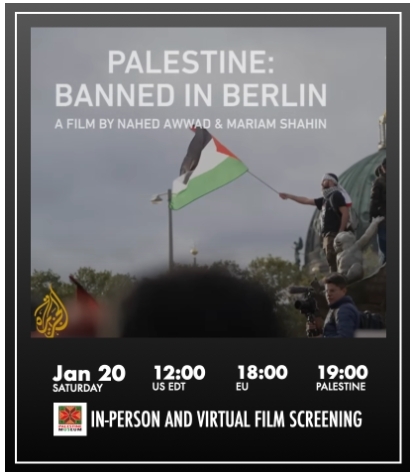
Saturday 20, 2024, 12:00 Noon US EDT; 18:00 Europe; 19:00 Palestine.
Hosted By Palestine Museum and reposted here for my subscribers.
This is a Hybrid Event, meaning you can attend virtually via Zoom or, in-person at the Palestine Museum US, 1764 Litchfield Turnpike, Woodbridge, Connecticut, USA.
Film running time is 50 minutes, English & German with subtitles .
The screening will be followed with post-screening Q&A discussion with film director Nahed Awwad and Berlin-based lawyer Nadija Samour.
About the Film
Berlin-based lawyer Nadija Samour and her colleagues fight against the suppression of Palestinian voices in Germany.
January 16, 2024
The Girl Who Stitched the Stars read by Shereen Malherbe live tonight on Sharjah TV
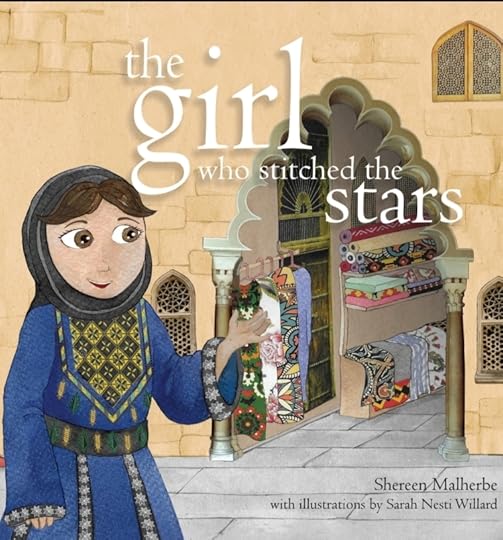

Join us this evening for Tuck Me In Tuesday’s evening children’s read. Tonight I will be reading my latest children’s book, The Girl Who Stitched the Stars.
See you there!
December 10, 2023
How the keffiyeh became a symbol of the Palestinian cause.

Article published by Vox. Written by Abdallah Fayyad.
There’s a scene in Home Alone 2 that stood out to me when I was a kid. It’s the one where Kevin McCallister gets chased through the streets of New York by the two dimwitted burglars known as the Wet Bandits. But it wasn’t the cartoonish chase that grabbed my attention. It was a brief moment that most of the movie’s viewers probably never noticed: An extra, playing a street vendor, was wearing a keffiyeh.
The traditional Middle Eastern scarf was on the screen for only a few seconds, but I remember feeling excited. Until that point, I had only ever seen people wearing keffiyehs in the Arab world. (My grandfather often wore one on his head and my brother wore one around his neck as a teenager; I would later wear one as a young adult.) It seemed as though anytime the keffiyeh did appear in Western media, it happened to be on the news and associated with violence of some kind. But seeing it worn casually in an American movie, even if it was merely in the background, felt like an embrace of my people — finally, something of ours didn’t seem threatening to Americans.
I was, of course, wrong — as is to be expected from a kid gleaning so much meaning from a couple of frames in a Christmas movie. Just last year, a North Carolina police department used a man wearing a keffiyeh as a target for officers in a school shooting drill. No matter that school shootings in the US are overwhelmingly committed by white men — to the organizers of that drill and others like it, a keffiyeh was still a stereotypical image of violence.
Over the last century, the scarf — and the black-and-white version of it in particular — became closely tied to the Palestinian cause. While Palestinians view it as a symbol of their cultural and national identity, others view it as a threat: Over Thanksgiving weekend, three Palestinian college students were shot in Burlington, Vermont, in what is being investigated as a potential hate crime; two of the young men, according to police, were wearing keffiyehs.
As long as Palestinians are subjugated as a people, then even something as simple as a traditional scarf turns into something bigger than a cultural display; it becomes an intrinsic part of a controversial journey toward freedom. So while Palestinians still wear the keffiyeh for the cloth’s practical purposes and cultural significance, they also often wear it to assert a political statement. After all, expressing Palestinian identity has become an act of resistance in and of itself — to remind others that this people is still here.
From practical garment to a sign of class struggleThe Palestinian keffiyeh evolved out of a common headdress for men across the Middle East. The most common version of the scarf today has the iconic black-and-white checkered pattern that some say resembles a fishing net. Its exact origins are difficult to trace, but according to Wafa Ghnaim, the curator for the Museum of the Palestinian People in Washington, DC, it’s clear that the scarf we know today was around in the 19th century.
“The keffiyeh, which is also known as the hatta, was a men’s head cloth, specifically, that distinguished [men in] nomadic or Bedouin communities from villagers and city people and townspeople,” Ghnaim, who is also a research fellow at the Metropolitan Museum of Art, told me.
To finish reading this article click here.
December 9, 2023
The Art of Gaza & preventing Genocide

Hi all,
I am reposting the Palestine Museum US who are selling Palestinian artwork.
You can access their work here via their website.
In the meantime, I am working on numerous Palestinian book projects to show my support and solidarity with our Palestinian brother’s and sister’s. There are almost no words left to describe the horror they are experiencing and the the latest disgraceful US veto of a Ceasefire is leading to more innocent deaths.
I truly believe in order to prevent this ever happening again we need to change the narrative on Palestine and the only way we can do this is through an increase in Palestinian stories, narratives, art and spaces where our youth can grow and learn about the real Palestine. We have a rich history and a future. We will not stop standing for Palestinian’s and this ongoing genocide happening in front of our eyes.
To help support a different future subscribe and stay up to date with the latest projects we have coming soon.
December 5, 2023
From The MuslimMatters Bookshelf: Palestinian Literature For All Ages


Published November 19, 2023
When mainstream media (mostly) suppresses Palestinian voices, when you don’t know how you can help, when you want to support out Palestinian brothers and sisters in occupied territories and in the diaspora – make du’a, donate, amplify your support and read Palestinian literature.
In this edition of the MuslimMatters Bookshelf, below we’ve listed a collection of books by Palestinians and those in the diaspora for all ages. Additionally, scroll to the end of the list for suggestions on bookish action items!
To view the list visit The MuslimMatters Bookshelf.
Zainab Bint Younus also gives bookish ideas on how to support Palestine. Now more than ever we need the narrative on Palestinian and Muslim voices to be heard. Let’s stop this dehumanisation from ever happening again by making authentic Muslim voices the way forward in schools, colleges and libraries worldwide. We can all make a change if we work together as so many people around the world have been doing. Now isn’t the time to give up!
You will find my novel Jasmine Falling listed for young adults. Don’t forget to add the latest to your list, The Land Beneath the Light; which has been nominated for the Palestine Book Awards. I also have a children’s series dedicated to Palestine. Subscribe to receive my latest news as we are busy working on more Palestinian book projects.
November 30, 2023
Liberation Begins Now: Time for Palestinians to Protect Their Collective Sumud

Repost from The Palestine Chronicle
By Ramzy Baroud
The truth is that Palestinians have succeeded, through their resistance and sumud, in reasserting Palestine on the global agenda. Shortly after the start of a four-day ceasefire in the war on Gaza, the prime ministers of Spain and Belgium, Pedro Sanchez and Alexander De Croo, appeared in a joint press conference at Rafah Crossing. While Sanchez described “what is happening (as) a disaster,” De Croo called for a “permanent cessation of hostilities” and for an end to the killing of children. Equally significant, the two European leaders declared that “we may decide to recognize the State of Palestine, if the European Union does not”. Coupled with the strong position of Ireland, some in Europe seem to be waking up to the fact that the Israeli occupation is the primary cause of the recent Gaza ‘hostilities’.Israel was not pleased by the evolving European position. It immediately summoned the ambassadors of both countries and sharply ‘rebuked’ them. This exaggerated response comes to show that Israel is not willing to give Europe even the narrowest of margins – as in condemning the killing of children or, expecting some kind of a peaceful settlement centered around Palestinian sovereignty. Spain and Belgium’s phrase of “we may decide” to recognize Palestine even without EU consensus is indicative of an actual foreign policy schism within Europe itself. It turned out that not all EU governments have the same tolerance towards the genocide in Gaza as, for example, Germany and Britain. Interestingly, other EU officials, too, are calling for a Palestinian State, though their intention is neither to ensure Palestinian freedom nor to safeguard Palestinian rights.EU’s chief diplomat Josep Borrell, for example, argued on November 20 that “the creation of a Palestinian state would be the best way of ensuring Israel’s security”. Even the former British Prime Minister, now Secretary of State for Foreign Affairs, used similar logic. Israel will not have security unless it guarantees “long-term safety, security and stability” for the Palestinian people, Cameron said.
[To read more visit and subscribe to The Palestine Chronicle]



